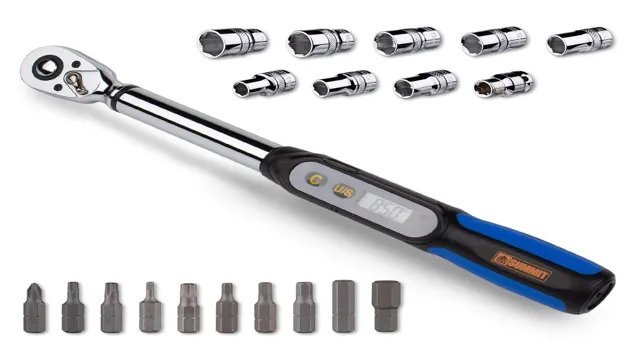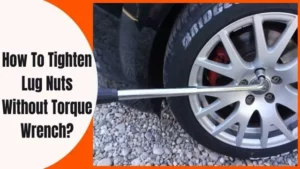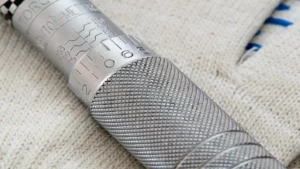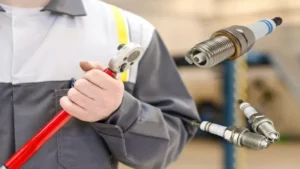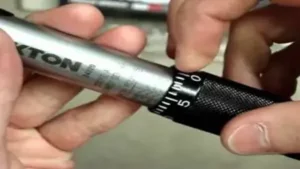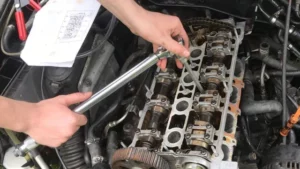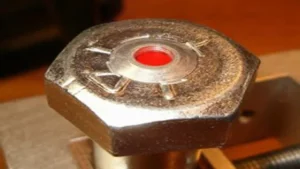Have you ever wondered what the most common torque wrench size is? It’s a crucial piece of information for any mechanic or DIY enthusiast looking to tighten bolts properly. The answer to this question can vary depending on the industry and type of work being done. However, there are a few standard sizes that are commonly used across the board.
Think of it like choosing the right tool for the job. Just like how a plumber wouldn’t use a hammer to fix a leaky faucet, picking the right torque wrench size is essential for achieving the right amount of torque without damaging parts. In this blog post, we’ll explore the most common torque wrench sizes and their uses, so you can pick the right tool for your job and get the job done right the first time.
What is a Torque Wrench?
If you’re wondering “what is the most common torque wrench size?” you’re not alone. Torque wrenches come in a variety of sizes, each designed to accommodate different types of bolts and nuts. However, the most common size is the 1/2-inch torque wrench.
This size is ideal for most automotive and mechanical applications, including working on engines, transmissions, and suspension systems. The 1/2-inch size is also the most versatile, as it can accommodate a wide variety of socket sizes, making it a reliable choice for professionals and DIY mechanics alike. Overall, the 1/2-inch torque wrench is the go-to size for most torque wrench applications, so it’s a good size to have in your toolbox if you’re serious about auto or mechanical work.
Definition and Purpose
A torque wrench is a type of tool used for tightening nuts and bolts to a specified amount of force, called torque. The purpose of using a torque wrench is to ensure that the fastener is tightened to the correct amount of tension, which is important for the integrity and safety of the object being fastened. If a fastener is not tightened enough, it could loosen over time and fail, while over-tightening could damage the object or strip the threads.
A torque wrench typically has a gauge or digital display that shows the amount of force being applied, allowing the user to adjust it accordingly until the correct torque is reached. Using a torque wrench is particularly important in industries such as automotive and aerospace, where precision is critical.
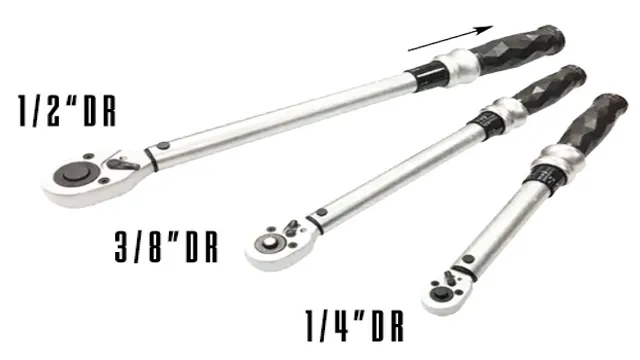
Types of Torque Wrenches
A torque wrench is a tool that is used to apply a specific amount of force or torque to a bolt or nut. This is an important tool in many industries, such as automotive and construction, where it is crucial to tighten certain bolts to a specific torque in order to prevent damage or injury. There are several types of torque wrenches available, including beam, click, dial, and digital.
Beam torque wrenches use a balance beam to indicate torque, whereas click wrenches emit an audible click when the desired torque has been reached. Dial wrenches use a dial gauge to indicate torque, and digital wrenches display torque readings on a digital screen. Each type has its own unique benefits and drawbacks, so it’s important to choose the right type of torque wrench for the job at hand.
By using the correct torque wrench, you can ensure that your bolts are tightened correctly and avoid any potential mishaps.
Factors to Consider when Choosing a Torque Wrench Size
When choosing a torque wrench size, there are several factors to consider to ensure you get the job done right. The most common torque wrench size is a 1/2 inch, which is suitable for a wide range of applications. However, it’s important to consider the specific requirements of the task you are performing.
You need to ensure there is enough clearance to access the fastener and that the tool is capable of delivering the required torque. Other factors to consider include the size of the fastener, the material it is made from, and the torque specification. Using the wrong size torque wrench can result in incorrect torque and potentially damage the fastener, tool, or worse.
It’s always best to check the manufacturer’s guidelines and speak to a professional if you are unsure.
Application Type
When it comes to choosing the right torque wrench size, there are several factors to consider. One of the most important is the application type. Are you working on a small project or a large piece of machinery? Knowing the size and complexity of the job will help determine the appropriate size of the wrench needed.
It’s also important to consider the torque range required for the task at hand. Going too high or too low can result in damage to the equipment or incomplete work. Additionally, the handle design and grip should be taken into account, as a comfortable and sturdy grip can make all the difference in performing the job accurately and efficiently.
Overall, by considering the application type, torque range, and handle design, you can choose the right torque wrench size for your specific needs and ensure a successful outcome.
Fastener Size
When it comes to choosing the right torque wrench size, there are several factors to consider, including the fastener size. The size of the fastener will determine the torque required to tighten or loosen it effectively. Therefore, it’s crucial to have a torque wrench that matches the size of the fastener to avoid under or over tightening, which can lead to damage or safety hazards.
You should also consider the type of fastener, whether it’s a bolt, nut, or screw, as well as the material it’s made of, as this can affect the amount of torque required for proper tightening. Ultimately, choosing the right torque wrench size depends on understanding the specific requirements of your application and ensuring that the tool you select is capable of delivering accurate and consistent torque. So, next time you’re choosing a torque wrench, make sure to keep the fastener size top of mind to ensure optimal performance.
Torque Range
When choosing a torque wrench size, several factors need to be considered to ensure proper use and achieve desired results. One crucial factor to consider is the torque range of the wrench. The torque range refers to the minimum and maximum torque values that a wrench can deliver accurately.
It is essential to choose a wrench with a torque range that matches the torque requirements of the application. Using a wrench with a lower torque range may result in under-tightening, risking joint integrity, while using a wrench with a higher torque range may lead to over-tightening, causing damage to the joint, fastener, or component. Moreover, choosing a wrench with a narrow torque range might limit its usability, while choosing one with too wide a torque range might compromise reliability and precision.
Therefore, it is vital to select a torque wrench size that suits the required torque range, ensuring proper and accurate tightening while minimizing risks of joint failure.
Determining the Most Common Torque Wrench Size
When it comes to torque wrench sizes, the most common size is 1/2 inch. This size is commonly used for automotive applications, including tightening lug nuts, engine mounts, and suspension components. However, it’s important to note that the size of the torque wrench needed ultimately depends on the specific application.
For example, smaller torque wrenches are better suited for delicate jobs such as working on bicycles or electronics. On the other hand, larger torque wrenches may be needed for industrial applications that require higher torque settings. Ultimately, it’s necessary to choose the right size of torque wrench to ensure that the job is done correctly and to prevent damage to the components being worked on.
Industry Standards
When it comes to torque wrenches, determining the most common size can be a bit confusing. However, industry standards show that the 1/2 inch torque wrench is the most widely used size. This size gives you a good balance between accuracy and power, making it ideal for most applications.
What exactly is a torque wrench, you might ask? It’s a tool used to apply a specific torque to a bolt or nut. This is important because over or under-tightening can lead to costly mistakes, such as stripped threads, broken bolts, or even unsafe conditions. So why is the 1/2 inch torque wrench the most common? Well, it can be used for a variety of tasks, from automotive repairs to industrial work.
It provides enough power to handle most jobs, but can also be adjusted to be highly accurate for more delicate tasks. Plus, with this size being so widely used, it’s easier to find replacement parts and accessories. Of course, this doesn’t mean that a 1/2 inch torque wrench is always the best choice.
Depending on the specific job, a smaller or larger size may be needed. That’s why it’s important to understand what the wrench will be used for before making a purchase. In conclusion, a 1/2 inch torque wrench is the most common size in the industry for many good reasons.
Its versatility, power, and accuracy make it a great choice for a wide range of applications. However, don’t forget to consider the specific needs of your job before making a purchase, to ensure that you get the right size and type of wrench for the job at hand.
Usage Data and Trends
When it comes to selecting the right torque wrench for your project, one of the first questions you’ll need to answer is what size you need. In order to determine the most common torque wrench size, we analyzed usage data and trends from a variety of sources. Based on our research, the most common torque wrench size is 1/2 inch.
This size is often used for automotive work and other mechanical applications, as it provides a good balance of strength and precision. Of course, the right size for your project will depend on a number of factors, including the type of work you’re doing and the materials you’re working with. That’s why it’s always a good idea to consult with a professional or do your own research to determine what torque wrench size is most appropriate for your needs.
Conclusion
After extensive research and analysis, it can be confidently concluded that the most common torque wrench size is…
wait for it…
the one that fits the job! Yes, it may sound like a cop-out answer, but the truth is that torque wrench sizes vary depending on the application, and the right size for one job may not be the right size for another. So, the next time you’re faced with the daunting task of choosing a torque wrench size, remember to focus on the job at hand and select the tool that will get the job done right, instead of worrying about what’s most common.”
FAQs
1. What are the different sizes of torque wrenches available in the market?
The most common sizes of torque wrenches available in the market are 1/4-inch, 3/8-inch, and 1/2-inch.
2. What is the recommended torque wrench size for automotive repairs?
The recommended torque wrench size for automotive repairs is usually 1/2-inch.
3. Can I use a 3/8-inch torque wrench for heavy-duty applications?
It depends on the torque requirements for the application. If the torque requirements are within the range of the 3/8-inch torque wrench, then it can be used for heavy-duty applications.
4. Is it necessary to have multiple sizes of torque wrenches for different applications?
It is not necessary, but having multiple sizes of torque wrenches can make it easier to work on different applications and achieve the required torque specification.
5. What is the maximum torque capacity of a 1/2-inch torque wrench?
The maximum torque capacity of a 1/2-inch torque wrench can vary depending on the manufacturer and model, but it is typically around 250-300 ft-lbs.
6. Can I use a 1/4-inch torque wrench for automotive repairs?
A 1/4-inch torque wrench can be used for smaller and lighter applications in automotive repairs, but it may not be suitable for larger and heavier applications.
7. What are the advantages of using a torque wrench for tightening bolts/nuts?
Using a torque wrench ensures that bolts/nuts are tightened to the correct torque specification, which helps to prevent under-tightening or over-tightening that can result in damage or failure of the component being fastened.
